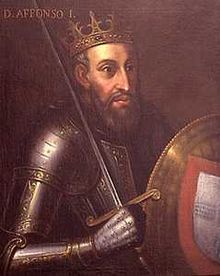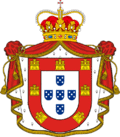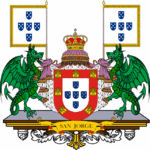- Afonso I of Portugal
-
"Afonso I" redirects here. For the African ruler, see Afonso I of Kongo.
Afonso I 
King of Portugal Reign 1139–6 December 1185
(73 years, 35 days)Coronation 26 July 1139 (aged 30) Successor Sancho I Consort Maud of Savoy Issue Urraca, Queen of León
Sancho I of Portugal
Theresa, Countess of FlandersHouse Capetian House of Burgundy Father Henry, Count of Portugal Mother Theresa, Countess of Portugal Born 25 June 1109
Guimarães (traditionally) and Viseu (documented), County of PortugalDied 6 December 1185 (aged 76)
Coimbra, Kingdom of PortugalBurial Santa Cruz Monastery, Coimbra, District of Coimbra, Portugal Religion Roman Catholicism Afonso I or Dom Afonso Henriques [1] (c. 1109, Guimarães or Viseu – 6 December 1185, Coimbra), more commonly known as Afonso Henriques (Portuguese pronunciation: [ɐˈfõsu ẽˈʁikɨʃ]), nicknamed "the Conqueror" (Portuguese: o Conquistador), "the Founder" (o Fundador) or "the Great" (o Grande) by the Portuguese, and El-Bortukali ("the Portuguese") and Ibn-Arrik ("son of Henry", "Henriques") by the Moors whom he fought, was the first King of Portugal. He achieved the independence of the southern part of the Kingdom of Galicia—County of Portugal—from the Kingdom of León, in 1139, doubling its area with the Reconquista, an objective that he pursued until his death, in 1185, after forty-six years of wars against the Moors.
Contents
Life
Afonso I was the son of Henry of Burgundy and Theresa of León, the natural daughter of King Alfonso VI of León. The pair reigned jointly as Count and Countess of Portugal until Henry's death, after which Theresa reigned alone.
Afonso, born in 1109, took the title of Prince after taking the throne of his mother, supported by the generality of the Portuguese nobility who disliked the alliance between Galicia and Portugal Countess Theresa had come to, marrying a second time the most powerful Galician count. In 1120, the young prince took the side of the Archbishop of Braga, a political foe of Theresa, and both were exiled by her orders. In 1122 Afonso became fourteen, the adult age in the 12th century. He made himself a knight on his own account in the Cathedral of Zamora, raised an army, and proceeded to take control of his mother's lands. Near Guimarães, at the Battle of São Mamede (1128) he overcame the troops under his mother's second husband and ally Count Fernando Peres de Trava of Galicia, exiling her forever to a monastery in Galicia. Thus the possibility of re-incorporating Portugal (up to then Southern Galicia) into a Kingdom of Portugal and Galicia as before was eliminated and Afonso became sole ruler (Duke of Portugal) after demands for independence from the county's church and nobles. He also vanquished Alfonso VII of León, came to the rescue of his mother, whose nephew he was, and thus freed the kingdom from political dependence on the crown of his cousin of León. On 6 April 1129, Afonso Henriques dictated the writ in which he proclaimed himself Prince of Portugal.
Afonso then turned his arms against the persistent problem of the Moors in the south. His campaigns were successful and, on 25 July 1139, he obtained an overwhelming victory in the Battle of Ourique, and straight after was unanimously proclaimed King of the Portuguese by his soldiers, establishing his equality in rank to the other realms of the Peninsula. The first assembly of the estates-general convened at Lamego (wherein he would have been given the crown from the Archbishop of Braga, to confirm his independence) is a 17th century embellishment of Portuguese history.
Independence from Alfonso VII of León's suzerainty, however, was not a thing he just could achieve militarily. The County of Portugal still had to be acknowledged diplomatically by the neighboring lands as a kingdom and, most importantly, by the Roman Catholic Church and the Pope. Afonso wed Maud of Savoy, daughter of Amadeus III, Count of Savoy, and sent ambassadors to Rome to negotiate with the Pope. He succeeded to relinquish suzerainty of his cousin Alfonso VII of León, becoming instead a subject of the papacy, as the kingdoms of Sicily and Aragon had done before him. In 1179 the bull Manifestis Probatum accepted the new king as vassal to the Pope exclusively.
In Portugal he built several monasteries and convents and bestowed important privileges to religious orders. He is notably the builder of Alcobaça Monastery, to which he called the Cistercian Order of his uncle Bernard of Clairvaux of Burgundy. In 1143, he wrote to Pope Innocent II to declare himself and the kingdom servants of the Church, swearing to pursue driving the Moors out of the Iberian Peninsula. Bypassing any king of León, Afonso declared himself the direct liegeman of the Papacy. Thus, Afonso continued to distinguish himself by his exploits against the Moors, from whom he wrested Santarém (see Conquest of Santarém) and Lisbon in 1147 (see Siege of Lisbon). He also conquered an important part of the land south of the Tagus River, although this was lost again to the Moors in the following years.
Meanwhile, King Alfonso VII of León (Afonso's cousin) regarded the independent ruler of Portugal as nothing but a rebel. Conflict between the two was constant and bitter in the following years. Afonso became involved in a war, taking the side of the Aragonese king, an enemy of Castile. To ensure the alliance, his son Sancho was engaged to Dulce, sister of the Count of Barcelona and Infanta of Aragon. Finally, in 1143, the Treaty of Zamora established peace between the cousins and the recognition by the Kingdom of León that Portugal was a sovereign kingdom.
In 1169 the now old Dom Afonso was disabled in an engagement near Badajoz by a fall from his horse, and made prisoner by the soldiers of the king of León, his son-in-law. Portugal was obliged to surrender as his ransom almost all the conquests Afonso had made in Galicia (north of the Minho) in the previous years.
In 1179 the privileges and favours given to the Roman Catholic Church were compensated. In the papal bull Manifestis Probatum, Pope Alexander III acknowledged Afonso as King and Portugal as an independent crown with the right to conquer lands from the Moors. With this papal blessing, Portugal was at last secured as a kingdom.
In 1184, in spite of his great age, he still had sufficient energy to relieve his son Dom Sancho, who was besieged in Santarém by the Moors. Afonso died shortly after, on 6 December 1185.
The Portuguese revere him as a hero, both on account of his personal character and as the mythical founder of their nation. There are stories that it would take 10 men to carry his sword, and that Afonso would want to engage other monarchs in personal combat, but no one would dare accept his challenge.
Scientific research
In July 2006, the tomb of the king (which is located in the Santa Cruz Monastery in Coimbra) was to be opened for scientific purposes by researchers from the University of Coimbra (Portugal), and the University of Granada (Spain). The opening of the tomb provoked considerable concern among some sectors of Portuguese society and IPPAR – Instituto Português do Património Arquitectónico (Portuguese State Agency for Architectural Patrimony). The government halted the opening, requesting more protocols from the scientific team because of the importance of the king in the nation's formation.[2][3]
Ancestors
These are the known ancestor of Afonso Henriques, going back five generations.[4]
Ancestors of Afonso I of Portugal 16. King Robert II of France 8. Robert I, Duke of Burgundy 17. Constance of Arles 4. Henry of Burgundy 18. Dalmas, Lord of Semur 9. Helie of Semur 19. Aremburge of Burgundy 2. Henry of Burgundy, Count of Portugal 1. Afonso I of Portugal 24. King Sancho III of Navarre 12. King Ferdinand I of León and Castile 25. Mayor of Castile, Empress of Spain 6. King Alfonso VI of León and Castile 26. King Alfonso V of León 13. Sancha of León, Empress of Spain 27. Elvira Mendes of Portugal 3. Teresa of León, Countess of Portugal 7. Ximena Moniz Descendants
Afonso married in 1146 Mafalda or Maud of Savoy (1125–1158), daughter of Amadeo III, Count of Savoy, and Mahaut of Albon.
Name Birth Death Notes By Maud of Savoy (1125–1158; married in 1146) Henrique (Henry) 5 March 1147 1147 Mafalda 1148 c. 1160 Urraca c. 1151 1188 Queen of León by marriage to King Ferdinand II of León. Sancha 1153 1159 Sancho 1154 26 March 1212 Succeeded him as Sancho I, 2nd King of Portugal João (John) 1156 1156 Teresa (Theresa) 1157 1218 Countess consort of Flanders by marriage to Philip I of Flanders. Duchess consort of Burgundy by marriage to Eudes III of Burgundy. By Elvira Gálter Urraca Afonso c. 1130 ? Natural daughter. Married Pedro Afonso Viegas. Lady of Aveiro. Other natural offspring Fernando Afonso ?[5] c. 1172 High-General of the Kingdom (Constable of Portugal) Pedro Afonso c 1130 1169 A.k.a. Pedro Henriques. 1st Grand-Master of the Order of Aviz. Afonso c. 1135 1207 12th Grand Master of the Order of Saint John of Rhodes (also known as the Knights Hospitaller). Teresa Afonso c. 1135 ? Married Fernando Martins Bravo or Martim Moniz. See also
Afonso I of PortugalCadet branch of the Capetian dynastyBorn: 25 July 1109 Died: 6 December 1185Regnal titles New title
King of Portugal
1139–1185Succeeded by
Sancho ITitles of nobility Preceded by
Henry and TheresaCount of Portugal
1112–1139
with Theresa (1112–1126)Independence
from LeónFamily of Vímara Peres (Counts) Vímara Peres • Lucídio Vimaranes • (rule by Betótez Dynasty) • Alvito Nunes • Nuno Alvites with Ilduara Mendes• Mendo Nunes • Nuno MendesBetótez family (Counts) Mumadona Dias with Hermenegildo González • Gonzalo Menéndez • Menendo González • Ilduara Mendes with Nuno AlvitesJiménez Dynasty (as King of Galicia and Portugal) House of Burgundy (Counts) Henry, Count of Portugal Spouse(s)ChildrenAfonso Henriques · Urraca Henriques, Countess of Trastámara · Sancha Henriques, Lady of Braganza de Langroiva and Noman · Teresa Henriques · Henrique HenriquesGrandchildrenInfante Henrique · Infanta Mafalda · Urraca, Queen of Léon · Infanta Sancha · Sancho I · Infante João · Theresa, Countess of Flanders and Duchess of Burgundy
Afonso I of Portugal Spouse(s)ChildrenInfante Henrique · Infanta Mafalda · Urraca, Queen of Léon · Infanta Sancha · Sancho I · Infante João · Theresa, Countess of Flanders and Duchess of BurgundyGrandchildrenTheresa, Queen of León · Infanta Sancha, Lady of Alenquer · Infante Raimundo · Infante Constance · Afonso II of Portugal · Peter I, Count of Urgell · Ferdinand, Count of Flanders · Infante Henrique · Infanta Branca, Lady of Guadalajara · Berengaria, Queen of Denmark · Mafalda, Queen of PortugalSancho I of Portugal Spouse(s)ChildrenTheresa, Queen of León · Infanta Sancha, Lady of Alenquer · Infante Raimundo · Infante Constance · Afonso II of Portugal · Peter I, Count of Urgell · Ferdinand, Count of Flanders · Infante Henrique · Infanta Branca, Lady of Guadalajara · Berengaria, Queen of Denmark · Mafalda, Queen of PortugalGrandchildrenSancho II · Afonso III · Eleanor, junior Queen of Denmark · Infante Fernando, Lord of Serpa · Infante Vicente · Infanta MariaAfonso II of Portugal Spouse(s)Urraca of CastileChildrenSancho II · Afonso III · Eleanor, junior Queen of Denmark · Infante Fernando, Lord of Serpa · Infante VicenteGrandchildrenInfante Roberto · Infanta Branca, Viscountess of Huelgas · Infante Fernando · Denis I · Infante Afonso, Lord of Portalegre · Infanta Sancha · Infanta Maria · Infanta Constança · Infante Vicente · Eleanor, Princess of DaciaSancho II of Portugal Spouse(s)NotesSancho had no children; he was desposed in 1247 and died the following year.Afonso III of Portugal Spouse(s)Matilda II of Boulogne · Beatrice of CastileChildrenInfante Roberto · Infanta Branca, Viscountess of Huelgas · Infante Fernando · Denis I · Infante Afonso, Lord of Portalegre · Infanta Sancha · Infanta Maria · Infanta Constança · Infante VicenteGrandchildrenConstance, Queen of Castile · Afonso IV · Infante Afonso, Lord of Leiria · Infanta Maria, Lady of Menezes and Orduña · Infanta Isabel, Lady of Penela · Infanta Constança · Infanta Beatriz, Lady of LemosDenis of Portugal Spouse(s)Saint Elizabeth of AragonChildrenGrandchildrenMaria, Queen of Castile · Infante Afonso · Infante Denis · Peter I · Infanta Isabel · Infante João · Eleanor, Queen of AragonAfonso IV of Portugal Spouse(s)Beatrice of CastileChildrenMaria, Queen of Castile · Infante Afonso · Infante Denis · Peter I · Infanta Isabel · Infante João · Eleanor, Queen of AragonGrandchildrenInfante Luís · Infanta Maria, Marchioness of Tortosa · Ferdinand I · Infante Afonso · Infanta Beatrice, Countess of Alburquerque · Infante John, Duke of Valencia de Campos · Infante Denis, Lord of CifuentesPeter I of Portugal Spouse(s)ChildrenInfante Luís · Infanta Maria, Marchioness of Tortosa · Ferdinand I · Infante Afonso* · Infanta Beatrice, Countess of Alburquerque* · Infante John, Duke of Valencia de Campos* · Infante Denis, Lord of Cifuentes*Illegitimate
children
includedGrandchildrenBeatrice, titular Queen of Portugal · Infante Pedro · Infante Afonso · Infante Fernando, Lord of Eça* · Infanta Maria Brites, Countess of Valencia de Campos* · Infanta Isabel Brites, Countess of Cigales and Buelna* · Infanta Joana, Lady of Buendía* · Infante Fernando, Lord of Cifuentes* · Infante Pedro, Lord of Colmenarejo* · Infanta Beatrice*
Ferdinand I of Portugal Spouse(s)ChildrenGrandchildrenMiguel, Crown Prince of Portugal**Notes: *the descendants of King Peter I and Ines de Castro's children
were recognized as legitimate and were Infantes and Infantas
**also an Infante of CastileBibliography
- Diogo Freitas do Amaral, D. Afonso Henriques. Lisboa: Bertrand, 2000. ISBN 972-25-1157-2.
References
- ^ Or also Affonso (Archaic Portuguese-Galician) or Alphonso (Portuguese-Galician) or Alphonsus (Latin version), sometimes rendered in English as Alphonzo or Alphonse, depending on the Spanish or French influence.
- ^ IPPAR: direcção nacional diz que não foi consultada sobre abertura do túmulo de D. Afonso Henriques, Público, 6 July 2006, accessed December 2006 (in Portuguese)
- ^ n:Portuguese Culture Ministry suspends opening of Afonso I's tomb
- ^ Genea - Portuguese genealogical site, according to: D. António Caetano de Sousa, História Genealógica da Casa Real Portuguesa, Coimbra, Atlântida, 1946, vol. I, p. 36; Afonso Eduardo Martins Zuquete (dir.), Nobreza de Portugal e Brasil, Lisboa, Editorial Enciclopédia, 1989, vol. I, p. 85.
- ^ c. (1166 is an erroneous date)
 This article incorporates text from a publication now in the public domain: Chisholm, Hugh, ed (1911). Encyclopædia Britannica (11th ed.). Cambridge University Press.
This article incorporates text from a publication now in the public domain: Chisholm, Hugh, ed (1911). Encyclopædia Britannica (11th ed.). Cambridge University Press.
Categories:- Portuguese Roman Catholics
- Roman Catholic monarchs
- Portuguese monarchs
- House of Burgundy-Portugal
- People of the Reconquista
- 1109 births
- 1185 deaths
- 12th-century Roman Catholics
- Christians of the Second Crusade
- Counts of Portugal (Asturias-León)
- County of Portugal
Wikimedia Foundation. 2010.


